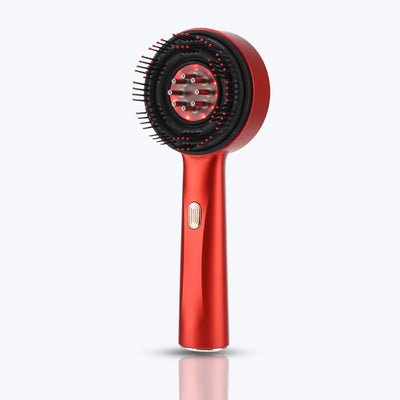Service dogs play an invaluable role in the lives of those who need assistance with daily tasks, emotional support, and even life-saving interventions. While many dog breeds can be trained to serve, certain breeds stand out for their intelligence, temperament, and willingness to help. Here’s a closer look at the top five breeds known for their exceptional service dog capabilities, along with tips on how to better care for each one.
-
Labrador Retriever
Labrador Retrievers are perhaps the most recognised and beloved service dogs, and for good reason. Their friendly and calm demeanour, paired with high intelligence and trainability, make them perfect candidates for various service tasks. Labradors excel as guide dogs for the visually impaired, mobility assistance dogs, and even in therapy roles. Their eagerness to please and adaptability in different environments make them an all-around top choice.
Key Traits:
- Friendly and sociable
- Intelligent and easy to train
- Adaptable to various environments
Care Tips:
- Exercise Needs: Labradors are energetic dogs and require at least an hour of physical activity daily. Activities like swimming, playing fetch, or running are great to keep them fit.
- Diet: Since Labradors are prone to weight gain, monitor their food intake closely and provide a balanced, healthy diet to prevent obesity.
-
Mental Stimulation: Labradors thrive on learning new tasks, so provide puzzle toys or regular obedience training to keep them mentally sharp. Keep them entertained and engaged with fun toys like the Wobble Wag Giggle Ball™, which makes playful sounds while rolled, perfect for keeping their minds sharp while they play.

- Health Monitoring: Regular vet check-ups are essential, especially to monitor for hip dysplasia and joint issues common in the breed.
-
Golden Retriever
Golden Retrievers are another popular breed for service work, known for their gentle nature and patience. Like Labradors, Goldens are highly intelligent and trainable, often used as guide dogs, hearing dogs, and emotional support animals. Their loving temperament makes them especially suited for working with children and individuals who require emotional assistance.
Key Traits:
- Gentle and patient
- Highly intelligent
- Ideal for emotional support and therapy work
Care Tips:
- Exercise Needs: Golden Retrievers need at least an hour of physical activity daily, such as walks, hikes, or swimming.
- Grooming: Their thick coats require regular brushing to prevent matting and reduce shedding. Bathing should be done as needed to maintain coat health.
- Diet: Maintain a balanced diet and monitor their weight, as Golden Retrievers can be prone to joint problems. Look for food that supports joint health.
-
Mental Stimulation: Goldens enjoy learning new commands and tasks. Incorporating agility training or obedience challenges keeps them mentally engaged. For interactive play, a toy like the Floppy Fish™ with its USB charging feature can provide endless entertainment. The realistic flopping motion encourages problem-solving and curiosity, making it a great tool for mental stimulation during playtime.

-
German Shepherd
German Shepherds are renowned for their loyalty, courage, and versatility, making them excellent service dogs in various fields. While they are often seen in police or military work, German Shepherds also make incredible service dogs for individuals with disabilities. They are particularly well-suited for mobility assistance and are often used as guide dogs. Their strong work ethic and ability to focus in high-stress situations make them reliable companions for those who need both physical and emotional support.
Key Traits:
- Strong work ethic and loyalty
- Highly trainable
- Focused and dependable under pressure
Care Tips:
- Exercise Needs: German Shepherds are high-energy dogs and require 1-2 hours of exercise daily. Long walks, runs, and structured playtime are essential to keep them fit.
- Training: Consistent training is vital to keep their skills sharp. German Shepherds enjoy working and thrive in environments where they have a sense of purpose.
- Grooming: Regular brushing is important to manage their shedding, especially during the shedding season. Their coat should be kept clean to avoid skin issues.
- Health Monitoring: Regular vet check-ups to monitor for hip dysplasia and other genetic issues are crucial. Maintaining a healthy weight can reduce the risk of joint problems.
-
Poodle
While not always the first breed that comes to mind, Poodles are excellent service dogs due to their intelligence and hypoallergenic coats. Standard Poodles are often used for individuals with allergies, as they shed less than most breeds. They are quick learners and excel in mobility assistance, seizure alert, and medical alert services. Their alertness and adaptability make them an ideal choice for service work that requires close attention to detail.
Key Traits:
- Intelligent and quick learners
- Hypoallergenic coat
- Adaptable to various service roles
Care Tips:
-
Grooming: Poodles require regular grooming to maintain their curly coats. Professional grooming every 4-6 weeks and consistent brushing at home helps prevent matting. A Self-Cleaning Grooming Brush is a convenient tool for at-home care, making it easier to keep their coat clean and healthy.

- Exercise Needs: Though not as high-energy as some breeds, Poodles still require daily exercise. Activities like walking, swimming, or agility training are perfect for keeping them active.
- Mental Stimulation: Poodles are highly intelligent and need mental challenges like learning new tricks, puzzle toys, or advanced training sessions to stay engaged.
- Health Monitoring: Like many large breeds, Poodles can be prone to joint problems and bloating. Regular check-ups and a well-balanced diet can help mitigate these issues.
-
Border Collie
Known for their incredible intelligence and energy, Border Collies are highly capable service dogs, especially in environments where physical tasks and agility are required. They are often used in psychiatric service roles, as their strong focus and intuition allow them to sense when their handler may need help. Border Collies thrive on learning new tasks and are ideal for individuals who need a dog that can handle multiple responsibilities.
Key Traits:
- Exceptionally intelligent
- Energetic and task-oriented
- Great for psychiatric service roles
Care Tips:
- Exercise Needs: Border Collies require extensive daily exercise—running, playing frisbee, or engaging in agility exercises are great ways to keep them physically fit.
- Mental Stimulation: Border Collies are among the most intelligent dog breeds and need mental challenges like obedience training or herding exercises to stay sharp.
- Grooming: Regular brushing is necessary to manage shedding and maintain coat health. A quick bath when needed helps keep their coats clean.
- Health Monitoring: Border Collies are generally healthy, but they can be prone to hip dysplasia and eye problems, so regular vet visits are important.
Conclusion
Each breed mentioned brings unique strengths to service dog work, but they all share traits like intelligence, loyalty, and adaptability. Whether it's providing mobility assistance, offering emotional support, or performing life-saving tasks, these dogs are invaluable companions. 
However, service dogs also need special care to ensure they remain healthy and happy. By focusing on proper exercise, grooming, mental stimulation, and health monitoring, you can keep your service dog performing at their best for years to come.
If you're considering a service dog, understanding the care needs of these breeds can help you make the right choice for both you and the dog.






















